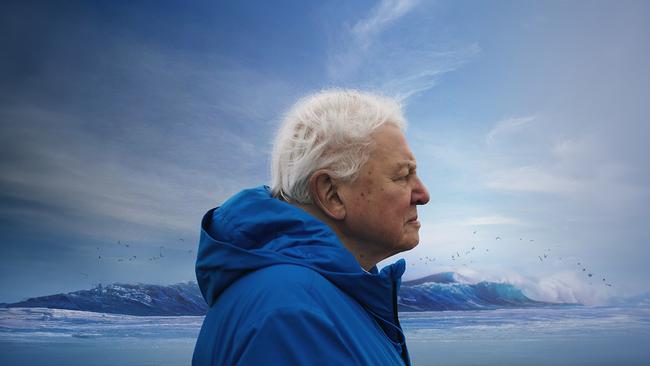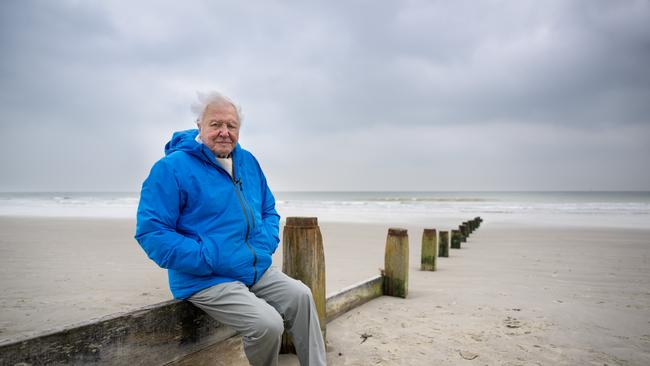Ocean with David Attenborough: All aboard for must-sea doco
This documentary is the least beautiful film the British biologist, natural historian, conservationist, broadcaster and filmmaker has made. This is intentional.

Ocean With David Attenborough
In Cinemas
★★★★
Ocean With David Attenborough is the least beautiful film the British biologist, natural historian, conservationist, broadcaster and filmmaker has made. This is intentional.
This documentary, shot in locations around the world and released to coincide with Attenborough’s 99th birthday on May 8, is a plea to save the “lifeblood” of the planet: the oceans and seas.
“After living for nearly 100 years on this planet I now understand that the most important place on Earth is not on land, but at sea,’’ he says in his introduction.
The plea is delivered with Attenborough’s characteristic optimism but is a plea all the same.
“If we just let nature take its course the sea will save itself. This could be the moment of change.”
That’s the fundamental message of this wake-up call of a documentary. At present we do not let nature take its course. We overuse and abuse the water in which all life began.
Attenborough does begin with beauty, such as mesmerising footage of sea mountains, the “last great wilderness”, kelp forests, seagrass meadows, coral reefs and all their spectacular inhabitants, large and small. “Once you’ve truly seen the sea you’ll never look at Earth the same way again.”
But he soon turns to his lens on what is killing the sea: industrial overfishing, especially bottom trawling and dredging, and coral reef bleaching due to heat stress.
Underwater cinematographers Doug Anderson and Tom Park contributed to the film and some of the footage is hard to watch.
A fishing vessel bottom trawling for scallops, for example, turns the seabed into something resembling Hiroshima. The only catch wanted is the scallops, but everything else - the so-called bycatch - dies in the process. It is, as Attenborough says, like seeing a “bulldozer ploughing through a pristine rainforest”.

The sight of factory vessels - catch, cook, freeze, pack - processing Antarctic krill, the foundation of that isolated and once-remote ecosystem, is also forbidding. It’s Antarctica and the water is full of blood.
These are brutal moments on the screen but we hear only Attenborough’s views on them, and those of some supporters who are interviewed. As an issues-driven documentary that is a flaw.
The closest Attenborough comes is to admit that “some claim” Antarctic krill fishing “is sustainable”. In a more rounded documentary, we would hear that from someone associated with the industry, or an independent marine expert.
Similarly Attenborough’s almost casual remarks, such as “2000 new marine species are discovered every year”, would be better substantiated by something more than “scientists say”.
On its release in cinemas, the feature film will be followed by 12 minutes of bonus content, A Deeper Dive With David Attenborough, including behind-the-scenes shots, additional footage and more interviews.
More may be explained here.
The criticisms above come from my journalist brain: all sides of a story should be told. As an occupant of planet Earth, I hope Attenborough is heard. He says less than three per cent of the ocean is protected. He warns coral reefs, including Australia’s Great Barrier Reef, which is part of the film, will disappear in the next 30 years.
However, he believes that with greater maritime protection the sea will save itself and in the final third of the film he shows examples of where this has happened, where the ocean has been “given time and space”, and what we see is a return to beauty. Here the underwater cinematography is a pleasure to watch, including motion-controlled shots of coral feeding and an up-close look at plankton.
“The ocean can bounce back to life. Together we now face the challenge of making it happen.’’ He adds that he has seen it happen once before, when near extinct whale species made a comeback after bans on industrial whaling.
This documentary, directed by Toby Nowlan, Keith Scholey and Colin Butfield, is released ahead of another date that is more important to Attenborough than his 99th birthday.
From June 9 to 13, the UN Ocean Conference will take place in Nice, France.
Its aim is a bold one: to protect 30 per cent of the world’s coastal and marine areas by 2030.
Attenborough’s new film is a passionate prayer that this will happen, even if he is unlikely to witness the end result.




To join the conversation, please log in. Don't have an account? Register
Join the conversation, you are commenting as Logout